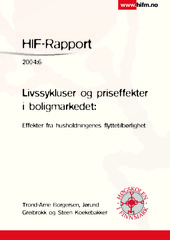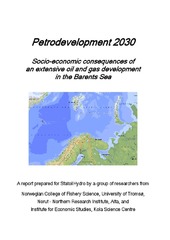Artikler, rapporter og annet (Handelshøgskolen): Recent submissions
Now showing items 501-520 of 553
-
Troms Kraft, hva nå?
(Chronicle; Kronikk, 2011) -
På tide å spekulere i aksjer?
(Chronicle; Kronikk, 2010) -
Er TIL-skuerne på nett?
(Chronicle; Kronikk, 2010) -
Nordnorske filialbestyrere
(Chronicle; Kronikk, 2010) -
Storstua – økonomisk tryllekunst?
(Chronicle; Kronikk, 2010) -
Kollektiv økonomisk galskap
(Chronicle; Kronikk, 2009) -
The moderator effects of perceived risk, objective knowledge and certainty in the satisfaction–loyalty relationship
(Journal article; Tidsskriftartikkel; Peer reviewed, 2011) -
Livssykluser og priseffekter i boligmarkedet: Effekter fra husholdningenes flyttetilbørlighet
(Research report; Forskningsrapport, 2004) -
Minimum Quality Standards and Novelty Requirements in a One-Short Development Race
(Journal article; Tidsskriftartikkel; Peer reviewed, 2010) -
Endogenous technology sharing in r&d intensive industries
(Journal article; Tidsskriftartikkel; Peer reviewed, 2010-01-11)This paper analyses endogenous formation of technology sharing coalitions with asymmetric firms. Coalition partners produce complementary technology advancements, although firms do not co-operate on R&D investment level or in the product market. The equilibrium coalition outcome is either between the two most efficient firms, or a coalition with all three firms. The two-firm coalition is the preferred ... -
Simultaneous versus sequential offers in dominant player bargaining
(Working paper; Arbeidsnotat, 2008-01-10)We consider bargaining between a number of players that are all essential in creating a surplus. One of the players is dominant in the sense that it ultimately decides whether the surplus will be created. The other players have an incentive to get a large share of the pie for themselves, but leaving enough for the dominant firm that it finds it profitable to create the surplus. Hence, the smaller ... -
Merger and bilateral bargaining : A note
(Working paper; Arbeidsnotat, 2008-02-05)In a context of bilateral bargaining between an upstream supplier and several downstream buyers, this note determines the conditions under which two buyers have an incentive to merge depending on whether (i) the bargaining process is simultaneous or sequential and (ii) the post merger buyer becomes pivotal or not. We also determine conditions under which the players will prefer to bargain ... -
Regional policy analysis in a simple NEG model with vertical linkages.
(Working paper; Arbeidsnotat, 2008-03)The paper presents a simple three-region, two-sector general equilibrium model that is used for analysing the effect of regional tax policies. The model includes exogenous asymmetry in terms of transport costs as well as a vertical industry structure that can account for endogenous location development in order to distinguish between the effect of ‘first nature’ and ‘second nature’ on the required ... -
Fishing on cold water coral reefs : A bioeconomic model of habitat-fishery connections
(Working paper; Arbeidsnotat, 2008-11)This paper applies a bioeconomic model in order to study different interactions between a harvested renewable resource and a non-renewable resource without commercial value that is negatively affected by the harvesting activity. This enables the analysis of for instance cold water coral habitats and their importance to commercial fish species. The fish is harvested either in a manner that does ... -
Managerial Incentives for Technology Transfer
(Working paper; Arbeidsnotat, 2008-03-27)This paper studies how a separation of ownership and management affects a firm’s incentives to transfer knowledge about technology to a rival in a Cournot duopoly. We consider a three-stage strategic delegation game, where there are two technologies available; one with increasing returns to scale and the other with constant returns to scale. Whilst the former is known to both firms, only the ... -
Økonomisk verdsetting av havmiljø : Anvendelse på havområdet utenfor Nordland
(Working paper; Arbeidsnotat, 2008-10)I sommer har konflikten om havområdene utenfor Lofoten-Vesterålen toppet seg, med sterke utspill fra fiskerhold om seismikkskyting på fiskefelt. Økende bruk av havet til ulike aktiviteter, det være seg fiske eller petroleumsvirksomhet, oppdrett, transport eller turisme, gjør at en bredere forståelse av hvilke verdier havet tilbyr er et viktig innspill i politiske avgjørelser. I dette arbeidet ... -
Sequential Bargaining with Public Intervention: The Optimal Subsidy Path
(Working paper; Arbeidsnotat, 2008-10)Models of sequential bargaining under asymmetric information often exhibit equilibria which are characterised by the fact that agreement is reached only with a delay and that the final (period) solution is ex ante inefficient. The latter means that agreement is not reached though it is efficient (aggregate pay off exceeds aggregate costs). In this paper we analyse how intervention by a third ... -
Petrodevelopment 2030: Socio-economic consequences of an extensive oil and gas development in the Barents Sea
(Research report; Forskningsrapport, 2007-10)The theme of this report is the regional socio-economic consequences of an extensive oil and gas development in the Barents Sea. The regional focus area includes Finnmark County and Murmansk Oblast. The introductory chapter explains the purpose of the study and the way the work has been done. The next two chapters provide a detailed account of the region and its basic characteristics. The general ... -
R&D and knowledge transfer strategies
(Working paper; Arbeidsnotat, 2007-04)We study the incentives for firms to share knowledge when they engage in R&D in order to make an uncertain innovation. The ini- tial stock of knowledge may be unevely distributed, and we look at how this affects the type of cooperative agreements that the firms will find it profitable to enter in to. Specifically, we consider the cases in which firms share initial knowledge only (reciprocal ... -
Bargaining with asymmetric externalities
(Working paper; Arbeidsnotat, 2007-02)We consider sequential bargaining between three firms that are all essential in creating a surplus. One of the firms is dominant in the sense that it ultimately decides whether the surplus will be created. The other firms have an incentive to get a large share of the pie for themselves, but leaving enough for the dominant firm that it finds it profitable to create the surplus. Hence, the smaller ...


 English
English norsk
norsk


















